In conversation with Columbia Journal’s Online Poetry Editor Brian Wiora, the poet Laura Kasischke discusses David Lynch and transcendental meditation, the future of the Internet, and of course, her poetry. Her enthusiastic and humorous personality is simply infectious. After reading this interview, we hope you will visit, or revisit, her poems.
Brian Wiora: Something I wanted to start off with, you mentioned in an earlier interview the influence that David Lynch had on your poetry. I’m curious about how other mediums of art influence your writing.
Laura Kasischke: Well, I don’t know how old I was when I first saw Blue Velvet, maybe in my mid-20s, but I’ve never seen anything like that before, that just so captured the seamy side of everything, the amazing contrast between the façades of our social interactions and the places that I lived. So, I just became really interested in dwelling in that place between the façade and the underbelly. But otherwise, I don’t really get a lot of ideas through other art forms, or listening to music. I read a lot of fiction and true crime and I’m interested in thrillers and other writing. But mostly, it’s poetry and reading about poetry that influences my poetry. That’s where I get my ideas.
Brian: I’m sure that’s very common with most writers, that they get their ideas from their own genre. What writers have influenced your own work?
Laura: My tastes and obsessions change a lot, but I would say, back in the day, some of the earliest poetry I loved was W.B. Yeats and Dylan Thomas because I was just fascinated by their language. I mean, sometimes, and I hope I’m not the only one, I don’t know what Dylan Thomas is really saying, but I don’t care because I like the way it sounds. From there, I became really interested in Theodore Roethke and the sound of that language.
And then, like most teenage girls, I was obsessed with Sylvia Plath for a long time, and I don’t think it was just the life story, although I found it pretty romantic in a sick way, but I think the work stands on its own and I wish she lived to die of old age.
Brian: Something really interesting I learned just recently about Plath is that she is actually five years younger than John Ashbery.
Laura: Wow… wow, it’s amazing to think about the kind of career she would’ve had… But other than those writers, I’m really interested in the French symbolists and the surrealists, and to go to your other question about other works of art, I would say I’m really interested in psychology, especially Freud. I have absolutely no real understanding of physics because I managed to skip that subject in high school and college, but I have a vague interest in theoretical physics and consciousness.
I wish I was like David Lynch and could do transcendental meditation, but I just can’t sit still long enough for that, which I know makes me exactly the kind of person who needs to meditate.
Brian: I’m exactly the same way, although it’s funny that I like reading and writing as much as I do, because I don’t even realize it, but I’m sitting still the whole time.
Laura: But I think we’re doing a kind of meditation writing poetry. When I get into the zone, I lose track of time. I feel centered. I am discovering things that I imagine have been waiting in my subconscious to reveal themselves to me.
Brian: Going back to someone you said earlier, I think about Dylan Thomas when I think about your work, just in terms of how interested you both are in language. Do you find that Thomas is a big influence on you?
Laura: I feel like that work was so important to me for so long, but now that I’ve gotten older, I would be scared to be influenced by Dylan Thomas. I would feel like I was being fraudulent. I tell people at writer’s conferences and workshops to not feel so self-conscious. But when I sit down to write, I feel self-conscious now. But just talking about this is good. I should go back and reread Dylan Thomas and not be scared to be influenced by him again.
Brian: Something I feel about poetry is that it doesn’t have to make sense; it has to feel sense. When I read Dylan Thomas, I think about that with him.
Laura: Yes, that’s a great way to phrase that.
Brian: Let’s talk about your work. Your most recent book of poems is Where Now: New and Selected Poems. The first question I wanted to ask you is, what made you want to do a selected? Were you approached about it? What’s the process like for doing a selected?
Laura: My publisher is Copper Canyon. I’m not sure if they had the idea first, but I think I was feeling that I have these books that I was enjoying the idea of preserving, that they might be worth preserving. No one is going to do a “New and Selected” with too many books, and I wanted a few poems from each book, and if I lived to get much older it would be too fat of a book. If I had nine collections of poetry and I took ten poems from each, added twenty new poems, well that’s a book, especially because a lot of my poems are two to three pages long. It was math, Brian.
Brian: That’s funny. I was wondering if it was an issue of the right number of books or whether you felt like you were transitioning as a poet. People talk about poets having different stages in their career. Do you feel like you are entering a new stage as a poet?
Laura: I like that idea and I think it’s possible. I am in an odd stage of my career. I’m writing shorter poems now. When I would write a short poem earlier in my career, it would come from a longer poem. I would look at the stanza of a long poem and think “oh that’s the whole poem.” But now they’re short from the get-go. It’s really hard to know if these poems are good or if they’re undercooked. Maybe I’m just getting lazy. Maybe this poem is just a tiny piece of what I should’ve written.
It’s funny, I was at a writer’s conference a few weeks ago and I was being asked, for like the twentieth time, about my writing process and I realize that I was saying the opposite of what I always said. Because I was talking about a different kind of poem than I’m writing now. I used to say I had no idea what I was going to write about before I sat down to write. Now, I understand what all those other poets were saying when they said they had the whole poem in their head first. I don’t know if that’s right or wrong, but that’s happening now.
Brian: I love single page poems and I love your single page poems. As my professor Lucie Brock-Broido would say, “a poem should only be longer than one page if it’s an emergency.”
Laura: Yes, I absolutely agree.
Brian: In terms of going through your old work, what was the process like selecting which ones you were going to put in the new collection?
Laura: Well, it was horrible; it was just awful having to decide. For one thing, we didn’t have computers in 1991, so I didn’t have anything from the first or second books on my computer. I had to open up the book and type it in. I just desperately wanted to revise the poems. I actually started to do that with some of the old poems, and then my editor said, “Laura, that wouldn’t be a new and selected, that would be a new and improved.” I also realized that the way I would edit a poem now is different than when I was 30 years old.
I also had a really difficult time choosing the poems. From doing readings over the years I can tell which poems other people liked. Or, if I sent the poem out 40 times and it never got published but I liked it enough to put in the book, I would think “maybe I’m just really wrong and it’s a terrible poem and it shouldn’t go in there.” I just went with the ones that I thought were the better ones. The book will live in my life a lot more largely than anybody else’s. Poetry books only reach so many people. It’s not a poetry book for myself, but I’m going to be looking at it a lot more than other people are.
Brian: What about the new poems?
Laura: I had to think about whether I wanted them a part of this book or part of a new collection. I also had to think “am I done with this poem?” So, I had a hard time with that too.
Brian: Were there poems that you looked through, and hadn’t thought about in a while, that surprised you in good ways?
Laura: Oh yes, absolutely. There were poems where I remember everything about writing it. I remember where I was when I wrote it— I just liked everything about that part of my life.
Brian: Do you have a particular example of the poem like this?
Laura: For my first book, I would say half a dozen or more of those poems I wrote one summer when I was at Ragdale, which is a writer’s colony outside of Chicago. I was obsessed again with surrealism. And I was reading a lot of French poets in translation. I just remember having those books around and thinking about them.
One of those poems is called “Driver’s Lullaby.” It’s about this friend of mine, he did not die by the way, you can’t tell that from the poem, but he fell asleep while driving. And then he woke up under a truck. He was fine. I’m thinking that was the most amazing thing because I could never fall asleep while driving because I get too anxious when I drive. I remember writing that poem and then showing it to him and he was very moved by the poem. Our other friends said that the poem made it seem like an elegy to him.
I remember writing that at Ragdale, and I didn’t have a computer, so I was writing it longhand. And I had notebooks and notebooks full of stuff because I was writing a lot back then. I remember I was really worried about losing that poem. I thought “what if on the way home on the train I lose my bag and I never see this poem again.” So, I sent that poem to my friend and asked him to hang on to it. I have a certain affection for that poem.
Brian: I wanted to talk with you about one poem in particular from your new poems called, “March.” One reason I love this poem so much is because it’s what I call a “closeted sonnet.” At first glance, you wouldn’t necessarily know it was a sonnet. But then you realize it has fourteen lines, a volta, and a rhyming couplet at the end. The more you investigate it, it’s kind of the perfect sonnet.
Laura: Well, that was not intentional. The poem went through a lot of different revisions. I think I published it in an earlier version, and after publishing it, I rewrote it a bunch of times. I sort of went through the assignment of writing about March and the different seasons. It was a little David Lynchish just considering the strangeness. I was considering the possibilities of the hallucinatory aspects of spring, how March shifts from winter to spring. I had a notebook full of images and then I realized these could all be March.
The original version had to many of those in it. It was just kind of chaos. I think that’s the hardest thing about writing short poems. It’s so scary to write a short poem because it’s all right there. In terms of it being a sonnet, I know I worked on the line breaks and it just kind of worked out.
Brian: It doesn’t surprise me that this sonnet wasn’t intended, because you’re not a formal poet. Yet, you do use rhyme often, and in very different ways. Can you talk about your use of rhyme in your poetry?
Laura: I just really like it. I think it was one of the first things I found seriously compelling about poetry, that stuff to me is so magical. I like to rhyme whenever I want to rhyme. That’s why I use internal rhyme, because then, I can rhyme when I want to. I don’t have to follow a pattern.
Brian: I really see that in your work. You’ll have some stanzas that use heavy rhyme, followed by stanzas with no rhyme at all.
Laura: Using sound to guide my poetry makes me surprise myself. At the same time, if I wasn’t using sound, I feel like I would have too many choices and much less interesting ones.
Brian: You mentioned earlier that your first book came out in 1991. How would you say your writing has changed since then?
Laura: I would say that what I’m writing about has changed. Back then, I didn’t have a kid, let alone a teenager to write about, so that’s changed. I also started to write fiction after my second book of poetry came out, and I think I started becoming more attracted to poetry for the music. I wrote more narrative poems earlier on because I think I had that storytelling instinct, but I wasn’t writing short stories yet. Now, I want poetry to be free from making sense.
Brian: What about poetry as a genre?
Laura: I’m sure you saw that article about how more people are reading poetry now than ever before. I think social media has a big impact on that. I see it now all the time. There are only so many conferences and readings one goes to. I don’t think we realized how many people were out there writing poetry until we had this Internet connection.
It is a little overwhelming at times, because I’d discover a poet who’s already written four books that everyone else seems to know, and I’m wondering “where was I?” The Internet has made both a larger and smaller subculture. I keep thinking that the Internet won’t last. That the government will shut it down for too much freedom or it will just collapse on itself.
Brian: I wanted to wrap up this interview with several popcorn questions, just sort of quick answers to fun questions. First off, what are you working on right now?
Laura: I’m working on a novel right now. It’s at about 3,000 pages so I’m revising it. I’ve been working on it for very long time now cutting and pasting a lot. Maybe that’s why I’m writing such short poems.
Brian: If you could have dinner with any dead writer, who would it be?
Laura: Edgar Allen Poe
Brian: If you couldn’t write or teach what would you do?
Laura: I have no skill in this, but I always have thought it was cool to be a photographer or a photojournalist, whatever that means.
Brian: If you could be any animal what would you be?
Laura: A cat.
Brian: If I could give you an all-expenses paid vacation anywhere in the world where would you go?
Laura: Moscow. I’ve never been, and I have no reason to go, but I’ve always wanted to see what Russia was really like.
Brian: Would you go during the harsh winter?
Laura: Yes, I want to go in winter and I’d want to take a train while I was there.
Brian: Are you a coffee drinker or you a tea drinker?
Laura: It depends on the time of day. Coffee in the morning and tea in the afternoon.
Brian: Lennon or McCartney?
Laura: Oh, definitely Lennon. Wouldn’t everyone say that?
Brian: Are you an early bird or a night owl?
Laura: Oh, a night owl. I don’t ever want to get up early.
Laura Kasischke is the author of ten collections of poetry. Kasischke has won numerous awards for her poetry, including the National Book Critics Circle Award, the Juniper Prize, the Beatrice Hawley Award, the Alice Fay DiCastagnola Award, the Bobst Award for Emerging Writers, and the Rilke Poetry Prize from the University of North Texas. She has also won several Pushcart Prizes, as well as received fellowships from the National Endowment for the Arts and the Guggenheim Foundation. Her most recent book, Where Now: New and Selected Poems was featured on the long list for the National Book Award in 2017.
Photo Credits: Courtesy of the Author




